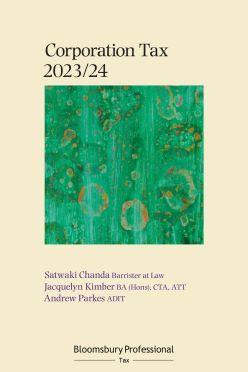Bloomsbury Professional Home
Tax
Q&A with Andrew Parkes
Andrew Parkes is joint author of the Bloomsbury Professional Corporation Tax Annual. He is a National Director, Tax at Andersen in London.
This text is included in our Bronze Tax Service, Silver Tax Service, Gold Tax Service and Platinum Tax Service.
Can you tell us a bit about your background and areas of expertise?
I started in the then Inland Revenue on 3 October 1988 for six weeks to help thin the old "Schedule D" files for the self-employed. This was a job that was supposed to done regularly, but a fair few files I looked at had people's 1945/46 returns in them! I stayed slightly longer than the six weeks, leaving after 29 plus years. During this time I completed my technical training (Inspectors were a thing of the past by then) moving to London and working in local offices, the fore-runner of HMRC's High Net worth Unit, Large Business and "Head Office" dealing with many international issues.
I specialise in Double Taxation Relief, Treaty Interpretation (including at the Supreme Court in Anson) and Transfer Pricing, areas I've continued with over the past 5 1/2 years after I moved to private practice.
How long have you been in this area and how has it changed?
I've been working in International Tax now for over 15 years and during that time I've noticed a greatly reduced level of tax avoidance as the UK and other Countries have beefed up their powers, and I think after the Financial Crisis the appetite for the highly aggressive artificial schemes reduced with an acknowledgement that certainty and simplicity is better. However, clients now need more help than ever to understand the ever more complex rules being introduced.
One thing that has definitely changed though is the use of IT because during the early years of my career, most aspects were paper-based and email was not used at all, which now takes up a lot of my time!
What are some of the current trends in your area?
In International Tax you can't get away from the OECD's work on the taxation of multinationals, especially the digital economy. This is Pillar 1 & Pillar 2 that dominates the discussions at tax seminars and water coolers (well mine anyway). It is a political fix to a political problem. A set of rules designed to make large multinationals pay sufficient tax to keep the public happy, but designed by committee, interpreted by the world, and likely to be ignored by the biggest economy.
And the most important recent updates?
Back to Pillar 2. This is designed to make multi-nationals pay a tax of at least 15%, but the rules are incredibly hard to follow, apply to a surprisingly few people, and due to the amount of resource being expended by Governments, Revenue Authorities and business on its implementation, there is a huge opportunity cost of what those resources could be doing otherwise.
What would you say are the major challenges for the industry at the moment and why?
Uncertainty. International standards are being designed but they are being introduced before they are finalised. We also will almost certainly face a change of Government who have often said one thing and done another, so how do we advise our clients to plan for the future? There is also the fact that HMRC is terribly under resourced meaning that their service levels are not what they should be - however I think that someone writing back in 1988 would say the same thing.
An increasing amount is being written about the application of AI in tax work – what are your thoughts?
I read of a (non-tax) judge that had used it to write part of a judgment where he knew the answer already but AI wrote it faster than he could (he checked that the text was correct) and I can see AI assisting with this sort of work. Will it be able to write something to persuade HMRC that your interpretation of the law is correct? It probably has the same chance I do, but where it may fail, or at least for the moment, is the interaction with the client, working out what they aren't saying, but still need advice upon.

